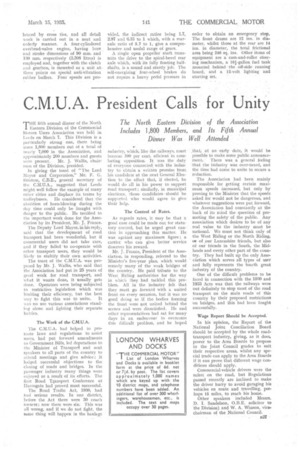C.M.U.A. President Calls for Unity
Page 41

If you've noticed an error in this article please click here to report it so we can fix it.
THE fifth annual dinner of the North Eastern Division of the Commercial Motors Users Association was held in Leeds on March 7. This Division is a particularly strong one, there being some 1,800 themberS out of a total of nearly 7,000• in. the Association, and approximately 200 members and guests were present. Mr. 3. Wallis, chair., man of the Division, presided.'
In giving the toast of "The• Lord Mayor and Corporation," Mr. F. G. Bristow, C.B.E., general secretary of the C.M.U.A., suggested that Leeds might well follow the example of many other cities and displace' its trams by trolleybuses. He considered that the abolition of horn-blowing during the (lay time could only be fraught with danger to the public. He testified to the important work done for the Association by its President, Mr. J. France.
The Deputy Lord Mayor, in his reply, said that the development of road transport had been wonderful, but if commercial users did not take care, and if they failed to co-operate with other transport users, they would be likely to stultify their own activities.
The toast of the C.M.U.A. was proposed by Mr. J. Wallis, who said that the Association had put in 25 years of good work for road transport, and what it wants done, it usually gets done. Operators were being subjected to restrictive legislation which was limiting their efficiency, but the best way to fight this was to unite. It was no use various associations standing alone and fighting their separate battles.
The Work of the C.M.U.A.
The C.M.U.A. had helped to promote laws and regulations to assist users, had put forward amendments to Government Bills, led deputations to the Minister of Transport and sent speakers to all parts of the country to attend meetings and give advice ; it lodged successful objections to the closing of roads and bridges. In the passenger industry many things were enjoyed as a result of its efforts. The first Road Tkansport Conference at Harrogate had proved most successful.
The Road Traffic Act, 1930, had had serious results. In one district, before the Act there were 30 coach Owners; now there were six. This was all wrong, and if we do not fight, the same thing will happen in the haulage industry, which, like the railways, must become 100 per cent, efficient in combating opposition. It was the duty of everyone connected, with the induStry to obtain a written promise from his candidate at the next General Election to the effect that, if elected, he would do all in his power to support road transport ; similarly, in municifial elections, those candidates should he supported who would agree to give their help.
The Control of Rates.
As regards rates, it may be that a good case could be made out for statutory control, but he urged great caution in approaching this matter. He was against any maximum figure; a carrier who can give better service deserves his reward.
Mr. J. France, President of the Association, in responding, referred to the Minister's five-year plan, which would remedy many of the weak bridges of the country. He paid tribute to the West Riding authorities for • the way in which they had tackled this problem. All in the industry felt that they must go forward with a united front on every occasion, hut it was no good doing so if the bodies forming the front were not united behind the scenes and were dissatisfied. He and other representatives had sat for many days in an endeavour to overcome this difficult problem, and he hoped :that, at anearly date, it would be possible to make some public announcement. There was a general feeling that the industry was over-taxed, and the time had come to unite to secure a reduction.
The Association had been mainly responsible for getting certain maximum speeds increased, but only by proving to the Minister that the speeds asked for would not be dangerous, and whatever suggestions were put forward, the Association had constantly at the back of its mind the question of promoting the safety of the public. Any association which desires to be of any real value to the industry must be national. We must not think only of the West Riding or the North Riding, or of our Lancashire friends, but also of our friends in the South, the Midlands and every other part of the country. They had built up the only Association which serves all types of user and fully represents the fourth great industry of the country.
One of the difficalt problems to be faced in connection with the 1930 and 1933 Acts was that the railways were out definitely to stop most of the road transport on the main roads of this country by their proposed restrictions on bridges, and this had been fought successfully..
Wage Report Should be Accepted.
In his opinion, the Report of the National Joint Conciliation Board should be accepted by the whole roadtransport industry, giving, as it does, power to the Area Boards to propose to the Joint Council grades to suit their respective areas, whilst any special trade can apply to the Area Boards if it can prove that different wage conditions should apply.
Commercial-vehicle drivers were the safest on the road, but Regulations passed recently are inclined to make the driver hurry to avoid garaging his vehicles en route and travelling, perhaps 15 miles, to reach his home.
Other speakers included Messrs. D. I. Sandelson, O.B.E. solicitor to the Division) and W. A. Winson, vicechairman of the National Council.




























































































